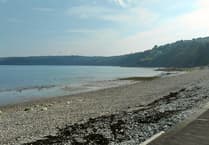The fact that the Isle of Man has been ’greylisted’ by the EU is not a disaster for the island, a tax expert says.
Former tax advisor Phillip Dearden was speaking after the EU delivered its verdict on the Isle of Man’s tax regime.
As we reported earlier this week, the Manx government has just until the end of 2018 to make changes needed to avoid us being blacklisted by the European Union.
The EU named 17 jurisdictions blacklisted as non-cooperative for tax purposes.
The Isle of Man was one 47 other jurisdictions put on a grey list of those deemed not to be fully compliant with EU and international tax standards.
Each has given a commitment to make changes to their tax regime and have until the end of next year do so, or face being put on the blacklist drawn up by the EU Code of Conduct group.
The Isle of Man is accused of failing to comply with standards of fair taxation and specifically having a tax regime that ’facilitate offshore structures which attract profits without real economic activity’
Alongside Guernsey, Jersey, Bermuda, Cayman Islands and Vanuatu, we are ’committed to addressing the concerns relating to economic substance by 2018’ states a report from the General Secretariat of the Council of European Union.
’Should these jurisdictions fail to address commitments by the established timeframe, the Council will revisit the issue of potential inclusion of the jurisdictions concerned into [the blacklist],’ warns the report.
It also states that a zero corporate tax rate cannot alone be a reason for concluding that a jurisdiction does not meet the requirements on fair taxation.
If the Isle of Man was placed on the blacklist, it would make it harder for Manx companies to trade with EU businesses, no matter what happens with Brexit.
A Manx government spokesman said: ’We have made a high level commitment to the Code Group and will have a continuing constructive dialogue with them.
’We do know that they had particular concerns around legal substance requirements and we are committed to work with them to address these over the next year. We need to now look at the detail that led to those concerns to see what changes we need to make.’
Former tax advisor Phillip Dearden told iomtoday.co.im that he believed an agreement would be reached which would satisfy, for the time being, the EU’s concerns.
He said: ’I don’t think it’s a disaster for the Isle of Man. But it is chipping away at what the island does.’
Mr Dearden explained that the EU’s concerns were about companies routing transactions through offshore entities in order to pay a zero rate of tax on profits.
But he questioned how much of that happens here without any real economic activity, and whether sanctions could be applied given that the UK is leaving the EU.
’At officer level there are a lot of people in the EU that really don’t like our zero rate of tax. It’s a position that works for us but they will come back again and again,’ he said.
But tax haven critic Richard Murphy of Tax Research UK believes inclusion on the grey list will be ’very bad news’ for Jersey, Guernsey and the Isle of Man.
He said: ’The EU Code of Conduct Group has given itself the right to decide whether these places are putting into place regimes that do encourage artificial relocation of profits.
’I would suggest a total reform of the corporation tax systems has to be on the cards.’
Mr Murphy said sanctions for failing to comply could see EU members states with-holding tax from payments of interest, dividends and royalties which he said would ’utterly neuter’ our status as an international financial centre.
Those listed as non-cooperative for tax purposes are American Samoa, Bahrain, Barbados, Grenada, Guam, South Korea, Macau, Marshall Islands, Mongolia, Namibia, Palau, Panama, Saint Lucia, Samoa, Trinidad and Tobago, Tunisia and the United Arab Emirates.
None of the jurisdictions placed on either the blacklist or grey list are EU member states.
IT professional Steve Burrows described it as the ’politics of envy’.
He said there was strong legislation in place already to prevent purely brass-plate companies being set up, without senior management and directors actually based here.
The Isle of Man was among 92 jurisdictions informed in February this year that it would be screened by the Code of Conduct group on business taxation.
ECOFIN, the EU’s Economic and Financial Affairs Council, unveiled its blacklist following a meeting on Tuesday.
Valdis Dombrovskis, vice-president of the European Commission, told a press conference: ’This will not be the end of the work. A number of countries have given commitments. We will follow this up and if they are not implemented, it’s possible they will end up on the blacklist. It’s something we will continue to monitor.’
Last month, the OECD gave the Isle of Man a fully compliant rating for tax transparency, making us one of only three countries so far to be given the top rating in both the first and second round of reviews.
Treasury Minister Alfred Cannan said: ’We welcome the decision from ECOFIN.
’The Isle of Man is a well regulated, transparent jurisdiction that has been leading the way in compliance with EU and international tax standards, as demonstrated by the recent OECD report.





Comments
This article has no comments yet. Be the first to leave a comment.